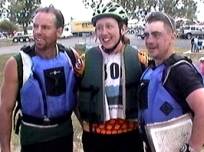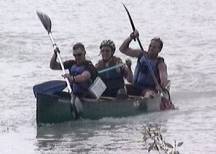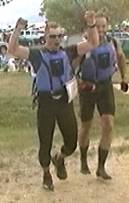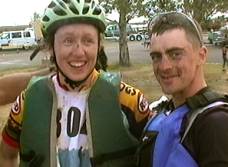| TEAM VETERAN LEADER ...WASATCH ADVENTURE RACE | |
|
|
TEAM VVNW Wins the Wasatch Adventure Race
Overshadowed by the majestic, snowy peaks of the Wasatch Range,
teams milled about the starting line at Utah Lake State Park, anxiously
awaiting the simple word that would launch them into a test of personal
endurance and team dynamics at the willful hand of Mother Earth.
Each adventure racer knew that soon, as the moon crested Mount
Timpanogos, they would find themselves deep in the heart of the Wasatch
Mountains, struggling against fatigue and inner strength to overcome the
challenges of the Wasatch Adventure Race 2002.
At CP5, appropriately named Mud Springs Top, teams dropped their
now very heavy, mud encased bikes and stepped out to trek.
For six teams, this point marked the end of their race.
The course had claimed its first victims.
The remaining teams moved quickly, refreshed by the event change,
cold air and a moonlit mountain range.
Heading north along Tibble Creek, they reached CP6 to learn of a
sudden course change. CP 6A
had been added to the course and it was located well west of the maps
provided to the racers. Unruffled,
teams continued on, following memorized directions to continue up the
Mill Canyon Trail until finding the CP.
At CP6A, another verbal brief gave teams an inkling of the route
to travel and the now tired, hungry racers picked up a general compass
azimuth and sought out after the ridgeline that would lead them to CP7.
Picking up the ridgeline and moving southwest, teams followed a
state trail to a trail intersection leading into CP7.
Several teams veered off the trail early and found themselves
northwest of the CP. Eight
teams never found the checkpoint. The trek continued for several more hours and more
checkpoints until teams transitioned back to their now frozen, mud
encrusted bikes at CP10 for a wild descent down the mud slick they had
summited the night prior. The
frozen mud claimed the derailleur of Team VVNW’s Mike Tschanz. After
quick repairs, six gears were recovered and the team was back on trail.
At CP 11, teams came to the realization that they had to progress
back over Battle Creek Canyon Trail, the muddy, high altitude route they
had faced yesterday. Team
VVNW opted for a slightly different route.
Already limited by bicycle mechanical problems, a quick map
analysis identified that the road network, although adding a substantial
amount of distance, could provide the team the speed and recovery time
necessary to push them forward in the standings.
They opted for the extra distance and skirted around Mahogany
Mountain following roads then back up Battle Creek Canyon to the
required attack point and into CP12.
The route selection gained them nearly 45 minutes and pushed them
into 2nd place in the 3 person mixed division.
At CP 12, the current 1st (Team Phoenix Gold/UPS) and
2nd (Team VVNW) place teams encountered each other for the
first time. It was evident
that an entirely new race had begun as Phoenix Gold moved off the 250 ft
rappel and VVNW rushed to get off the cliff and try and further reduce
the time gap.
For more information about the Veterans of the Vietnam War,
Inc., contact them at 1-800-VIETNAM or www.vvnw.org.
To find out about Team VVNW and their preparation for the Armed
Forces Eco Challenge, go to www.vvnw.org/teamvvnw.
|



